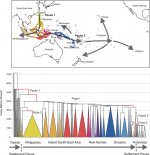Arnold's post on linguistic(s) put me in mind of something I never got around to blogging last year. The hook was Richard Zoglin's appreciation of George Carlin in Time:
Most famously, Carlin talked about the "seven words you can never say on television," foisting the verboten few into his audience's face with the glee of a classroom cutup and the scrupulousness of a social linguist.
"Social linguist" — I had an image of Geoff Pullum at a cocktail party, with one hand in his blazer pocket and the other wrapped around a martini glass. But on reflection I figured the phrase was what the writer had made of hearing sociolinguist. In fact social linguist gets 700+ Google hits, most of them almost certainly the products of mishearings:
"Language is never about language," said social linguist Walt Wolfram. (Associated Press)
Barbara Kannapell, a social linguist based in Washington, said the shortage of sign-language interpreters is a national problem. (New York Times)
In a popular book of that name, social linguist Deborah Tannen has documented just how much our culture is dominated by an "adversarial frame of mind." Kenneth Plummer, Intimate Citizenship (U of Washington Press)
You'd have to say, then, that these are eggcorns in the technical sense. But does it really matter? I mean, "social linguist" could have been the standard term, right?
Read the rest of this entry »

